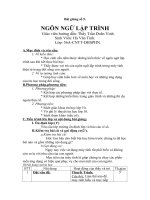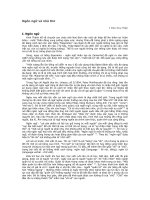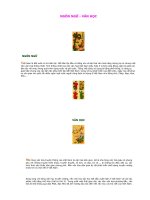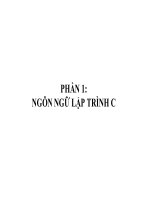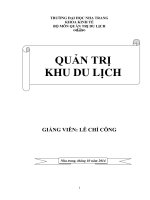Bài giảng ngôn ngữ anh du lịch 1
Bạn đang xem bản rút gọn của tài liệu. Xem và tải ngay bản đầy đủ của tài liệu tại đây (1.53 MB, 29 trang )
1
TRƯỜNG ĐẠI HỌC NHA TRANG
KHOA NGOẠI NGỮ
BÀI GIẢNG NGÔN NGỮ ANH DU LICH 1
ENGLISH FOR TOURISM & HOSPITALITY TERM I
Th.S GVC: NGUYỄN THỊ THÚY HỒNG
Đơn vị: Bộ môn Biên- Phiên dịch
Thời gian giảng dạy: 6/2015
2
UNIT 1
INTRODUCTION TO TRAVEL AND TOURISM
VOCABULARY
READING
Read the text about travel and tourism and check your answers.
People travel for lots of reasons. They make journeys to and from school or work every day; visit
friends and
family; take day trips shopping or to football matches; go out for evening entertainment such as
the cinema;
and they go away on business or study trips. So when does travel become tourism? When people
travel to and
stay in a place which is not where they live. For example there is recreational tourism if you
want to relax and
have fun, maybe at the beach. There's cultural tourism: sightseeing or visiting museums to learn
3
about history,
art and people's lifestyles . With adventure tourism you explore distant places or do extreme
activities. Ecotourism
is about ethical and responsible trips to natural environments such as rainforests. Winter tourism
is usually
holidays in resorts where there is snow and people go skiing or snowboarding. Sport tourism is
to play or watch
different sporting events like the Olympics. Educational tourism is to learn something, possibly a
foreign
language, abroad. Nowadays there is also health tourism to look after your body and mind by
visiting places
like spa resorts; religious tourism to celebrate religious events or visit important religious places
such as Mecca
for Muslims; and gap-year tourism when young people go backpacking or do voluntary work
between school
and university.
1.Read the text again. Match the type of tourism with its definition and an
example. Pair work.
4
2. Read the text again and underline the correct answer to each question.
Pairwork
5
3.
6
4.Read the text again and answer the questions.
1 How many travellers arrive in destinations across the world every year?
2 How can you book holidays?
3 Why do you need to purchase tickets for airlines, trains , ferries and coaches in advance?
4 What other transport service is it a good idea to book in advance?
5 When can you arrange local transport?
6 For who m and what is there a wide range of different accommodation options?
7 Which kind of accommodation includes breakfast, lunch and dinner?
8 Where is this a common option?
9 Do you pay for information from Tourist Inform ation Points?
10 Who ca n take you sightseeing or show you tourist attraction s?
LISTENING
1. Listen to a conversation about where to go on holiday and match each
member of the family with the type of tourism they would like from reading 1.
Group work.
1 Dad cultural ;
2 Grandma
3 Hannah
4 Josh
5 Mum
6 Zoe
7
2.
SPEAKING
Work in pairs: A and B. Look at the pictures in exercise 1 of different holiday
destinations and role play a conversation between a travel agent and a
customer. Try to use expressions from exercise II.
Student A: you are a trave l agent. Ask questions abou t what kind of hol iday the customer
wants this year.
Student B: you are a customer. Answer questi ons about what kind of hol iday you want this
year. When you finish , change roles.
GRAMMAR .
Complete this text about the National Trust with the words and expressions in
exercise II. Be careful to use the appropriate grammatical form. Then listen
and check.
The National Trust is a (1) charity and a non-(2) ______organisation , which (3) British tourism
to artistic, historical and natural sites in a (4)………………… way.It has two (5)
8
…………………………, one in London and another inSwindon , as well as hundreds of
(6)……………… all over the UK. Places with the (7)………………………. , 'National
Trust'(8)………………………………………. themselves through the image of conservation
and heritage. However, many of the thousands of visitors to National
Trust sites hear about them by (9) ……………………………………………………… from
friends, colleagues or relatives. They provide great days out for the whole family as you can
enter many sites for free and you can also hire venues for special events at extremely (10)
_______
PRACTICE
1.Work in pairs. Follow the instructions below, then swap roles.
Student A: Ask your partner about their interests. Then choose the best activity for them from
exercise 6.
Student B: Tell your partner about your interests and what you like and don 't like doing. Do you
agree with
Student A's choice of activity for you?
2. Match the terms with the correct definitions.
1 Advertisin g
2 Promotion
3 Marketing
a It keeps a product or service in the minds of customers and helps stimulate
their demand for it.
b lt makes sure that customers buy a product or service by understanding and
meeting their needs.
c.lt brings a product or service to the attention of customers through the media
to persuade them to buy.
9
UNIT 2
VOCABULARY
READING
1. Read the text about tourism organisations and check your answers.
Tourism organisations fall into three categories. Firstly they can be non-governmental
organisations or a charity like the World Tourism Organisation, a United Nations' organisation
which promotes 'the development of responsible,sustainable and universally accessible tourism'
(UNWTO). Secondly, they can be government organisations likeBritain's national tourism
agency, Visit Britain, which markets British tourism at home and abroad Thirdly, they canbe
private sector organisations like Thomas Cook, which promote and sell holidays for profit.
We can separate this last group into three more categories. Independent companies have one or
10
more branches,
which can often be close to each other. They sell their holidays to people locally and market
them by word of mouth. Miniple companies have several branches in different areas, which
sometimes use different trade names and they have a head office, which can manage the
organisation's marketing strategy centrally. Multiple agencies have branches in all major towns
and cities and they can be part of very large tourism sector companies. They market holidays on
the basis of competitive prices or special offer packages. In addition to this, travel agents can be
members of trade associations, organisations representing travel companies who can help with
marketing and
protect customers' rights. Of course nowadays many people prefer online do-it-yourself tourism
to any of these
organisations.
2. Read the text again and complete the table.
LISTENING
11
Complete this text about the National Trust with the words and expressions in
exercise 4. Be careful to use the appropriate grammatical form. Then listen
and check.
The National Trust is a (1) charity and a non-(2) ______
organisation , which (3)………………………………………………… British tourism to
artistic, historical and natural sites in a (4) …………………………………………….way. It has
two (5)……………………………………… , one in London and another in
Swindon , as well as hundreds of (6)………………………………………………… all over the
UK. Places with the (7)………………………… , 'National Trust'
(8)…………………………………………. themselves through the image of conservation
and heritage. However, many of the thousands of visitors to National
Trust sites hear about them by
(9)………………………………………………………………………… from friends,
colleagues or relatives. They provide great days out for the whole family as you can enter many
sites for free and you can also hire venues for special events at extremely (10) ________
prices.
READING
Read the short descriptions of National Trust sites and match a person with a
place to visit.
NATIONAL TRUST
1 Wellbrook Beetling Mill: do you like trying new crafts? Do you enjoy going for walks in the
country and having
picnics on the lawn? Then come to this water-powered linen mill in Northern Ireland . It's open
2-6 p.m . March
to September.
2 South Foreland Lighthouse: can you imagine living and working in a lighthouse on the
White Cliffs of Dover
overlooking the sea , at the time of the first international radio transmission? Find out what it's
like and learn about
12
Marconi and Faraday's early experiments, March to October, 11 a.m. to 5.30 p.m.
3 Red house, Kent: if you love looking at beautiful things, this is the place for you. You can see
William Morris's art
nouveau furniture, Edward Burne-Jones's original artwork, or try relaxing and playing games in
the landscaped
garden . Open March to December 11 a.m. to 5 p.m.
4 Theatre Royal, Suffolk: do you have a passion for drama? Visit Britain's last Regency theatre.
You can see the
amazing hand-painted ceiling. It's just like the sky! Then watch a 19th-century-style play. Open
February to
November, Tuesday and Thursday p.m., Saturday and Sunday a.m. Entrance is free. You only
pay for performances.
5 Dunster Castle, Somerset: are you mad about history? Explore the secret passage in the
medieval castle. Discover
the Lovers' Bridge in the gardens. Go bat-watching in the great hall. Find out about the lives of
Dunster's noble
families . Visit the gardens all year round, 11-4 in winter, 11-5 in summer. The castle opens
March to October 11-5
[IJ Claudia is quite artistic and she loves trying new things . She doesn 't like science, but she
likes being in the country.
b David likes art and architecture and he also enjoys rela xing and playing games . He hates
learning about history.
c Gwen is mad about history and drama. She hates being outside and doesn 't really like gardens
or nature.
d Holli is very romantic and likes investigating mysteries and nature-watching. She's also quite
interested in history and gardening.
e Mi ck has a passion for science and loves findin g out about how things work. He doesn 't like
going to museums or to theatres.
SPEAKING
Work in pairs. Follow the instructions below, then swap roles.
Student A: Ask your partner about their interests. Then choose the best activity for them from
13
exercise 6.
Student B: Tell your partner about your interests and what you like and don 't like doing. Do you
agree with
Student A's choice of activity for you?
READING
Read the text and check your answers.
People are often unclear about exactly what marketing is, and confuse it wi th advertising and promotion ,
both important parts of marketing. Advertising brings a product or service to the attention of customers
through the media e.g. newspapers, TV, or the Internet to persuade them to buy it. Promotion keeps a
product or service in the minds of customers and helps stimulate their demand for it, often through
advertising. Marketing is altogether more complex. It is all the activities involved in making sure that
customers buy a product or service by understanding and meeting their needs. Traditionally this is cal led
the four Ps marketing mix: Product; Price; Pl ace; Promotion. In other words you need to market the right
product at the right price in the right place and in the right way if you want to sell it. You could add one
other Pto this: you need to sell it to the right people.
You can identify the right people through a process called market segmentation .This is when you group
together people with similar needs and wants to identify your target customers so you can successfully
market your product to them. There are many ways of doing this, for instance: by the amount of money
people have (do they want budget or luxury holidays?);
by the kind of activities they're interested in (heritage, nature or adventure); by their circumstances (are
they single, a
couple, or afamily?); by their age (18-25 or 60+); and by the kind of tourists they are (independent or
pampered).
14
LISTENING
Listen to the interview with a travel agent about his company's e-marketing
strategies and decide if these sentences are true (T) or false (F). Correct the
false ones.
1 They use TV and radio adverts. F
No, they don 't use them because they are too expensive.
2 They sometimes place ads in newspapers or magazines they think their target customers buy.
3 They advertise in specialist travel brochures, leaflets or tourism guides.
4 Their main marketing area is online.
5 They use a combination of low-cost e-marketing strategies.
6 They don't like social networking sites.
7 They never advertise on search engines.
8 Banners are not competitive and they don't always reach the target customers.
9 It's not possible to book online.
10 They have great word of mouth marketing through their forum
WRITING
Work in groups of three. Look at the picture of a holiday destination. You are
the marketing team for a big travel company. Choose your target customer
and write an advert marketing the holiday to them. Remember the 4 Ps
(Product, Place, Price and Promotion) and decide what media to advertise
through. In your advert, include details of:
• suitable activities for customers to do
• facilities and services you offer
• the price (with offers/discounts)
• the length and period of the holiday (try to
suit it to your customers)
• other information to attract your customers
15
UNIT 3 TYPES OF TRANSPORT
VOCABULARY
16
READING
Match these words and expressions from the text with their definitions. Pair
work.
17
LISTENING
1. Listen to the conversation and decide where it takes place (in a ticket
office, travel agency, tour operator's, on the phone) and what kind of
tickets the customer wants to buy.
2. Listen to the conversation again and complete it with the missing
information. Page 14
SPEAKING
Work in pairs. Role play conversations at the ticket office. Use the dialogue from exercise 5
( page 14) to help you. Then swap roles.
READING
Read the text and complete the table.
YOU ARE at yourfor shortholiday journeys,destinationbut they, andcannowbe expensive.you
need toManycontinuechargeyourperjourney.passengerTaxis, pieceareofquickluggageand,
as well as surcharges for airport and night time journeys. Ifyou want to be free to travel when
and where you like, car hire can offer good value. You pay a daily or weekly rate for hiring a car,
plus fuel costs and you choose the kind ofcar you want, but most are bad for the environment.
Adventurous tourists can rent a motorbike , moped or bicycle. These are cheaper and also more
18
environmentally-friendly, but watch out for traffic or people stealing your bike! For people on a
budget, public transport is a good and green option. Cities usually have a choice ofunderground ,
buses, trains and sometimes trams and cable cars too.
In small towns, the options are more limited. Cost and convenience vary a lot in different places, so look
out for special offers like combination tickets , weekend or all-day travel passes . Ofcourse ifyou want to
save your money and the planet, you could always walk!
WRITING
Write a reply to John Humphries's email.using the information in your
transport survey. Be honest about the local transport available, but be as
positive as possible. Remember you want tourists to visit your town! ( PAGE
16)
Dear Mr Humphries,
Thank you for your recent email. In answer to your questions
19
UNIT 4 ACCOMMODATION
VOCABULARY
READING
Read the text and choose the correct answer.
1 Hotels are accommodation at the
A budget end of the market . B high end of the market. C low end of the market.
2 Guesthouses and B&Bs are different from hotels because they are generall y run by
A families . B one person. C staff 24/7.
3 You can visit a timeshare
A all year round. B at a specific time each year. C onl y in the summer.
20
4 House swapping helps you to
A avoid boredom . B avoid cooking . C make friends.
5 Hostels appeal to
A couples . B families. C young people .
6 Campus accommodation is available for tourists to rent during
A the holidays and term time. B the holidays . C term time.
7 For comfortable and mobile campsite holidays try
A campervans . B tents. C tepees
Ntasteowadays,, budgetthe andchoicedestinationof touristisaccommodationendless. At the
ohighsuitendyour of the market there are hotels, offering rooms and meals. Motels areimilar,
except they are for motorists. So they are generally on major roads and always provide parking,
but not always meals. B&Bs, or guesthouses, differ from hotels as they are usually small, less
expensive, owner-occupied, family-run businesses without staff on call 24/7. Alternatively,
holiday villages are popular with families who may be travelling on a budget. They offer a
choice of
self-catering accommodation from small wooden cabins or chalets to studio apartments to large
holiday villas, all in modern resorts with many leisure and recreational services available on site.
Private holiday rental offers a wide variety of accommodation. Then there are timeshares, where
several people own accommodation they can use at specific periods each year. To avoid getting
bored with the same destination , how about doing a house swap, where people holiday in each
others' houses? Hostels provide a low-cost, self-catering alternative to hotels, and appeal to
young travellers, as the shared dormitories make it easy to meet people. Increasingly, universities
offer campus accommodation in students' halls of residence during the holidays. This is the type
of accommodation you often find on study holidays, but it can also be a cheapand sociable way
to take a city break.
If you're looking for an adventure on a budget, campsites are perfect. You can take your own
tent, or even stay in a traditional round Mongolian yurt or a tall Native American tepee. For more
comfort, there are also caravans and campervans, which enable you to enjoy a holiday on the
move. Finally, if you like to combine transport and accommodation, why not try a barge, a long
flat boat ; Iwhich travels on rivers and canals, or a yacht if you prefer the sea
21
LISTENING
Listen to a man checking in at a hotel and complete his hotel registration
form.
SPEAKING
Work in pairs. Role play the conversation between the hotel receptionist and
the customer and complete the hotel registration form with your partner's
information
22
READING
Read the text about accommodation services and facilities and complete the
table.
The kind offacilities and services available to you on holiday varies greatly according to your
choice of accommodation .
Catered accommodation such as hotels, guest houses and B&Bs is generally categorised using a
star system
which varies from country to country.
Generally one star tends to indicate budget accommodation, offering basic facilities such as en
suite bathrooms
and TVs in all the rooms and services such as breakfast, drinks and daily room cleaning by
chambermaids.
Two stars may additionally offer guests bath towels, complimentary toiletries such as shower
gel, a reading light,
and a credit card payment facility.
Three star hotels often also provide a hairdryer and telephone in every room as well as internet
access either in
a public area or in the room, laundry and ironing services, and the hotel reception is staffed for
around 14 hours
by bilingual staff, speaking English and the native language .
The reception of a four star hotel should be manned for up to 18 hours, have a refrigerated
minibar or room service
for drinks, and an a la carte restaurant. There would also probably be a lift and more comfortable
furniture.
Finally five star luxury accommodation should offer a reception area staffed 24/7 by multilingual
staff, a doorman
to welcome guests, valet parking, a porter to take luggage to your room, and a safe in the room
for valuables.
There are often gym and spa facilities available too.
23
LISTENING
Listen to the telephone conversation between a hotel guest and the
receptionist. Put a tick (.I) under 'G' for all the services the guest requests,
and under 'R' for all the services the hotel receptionist says are available at
the hotel
SPEAKING
24
Work in pairs. Role play a conversation between a guest and a receptionist
asking and answering about different services. Take notes about the available
services, then swap roles. Use these expressions to help you.
WRITING
Now write a postcard to a family member or friend telling them about your
hotel stay. Use your notes about the facilities and services in exercise 11 (
PAGE 20).
Dear
- "
I'm staying at the Grand Palace Hotel and the services and facilities are excel/ent. For example
there is
25
UNIT 5
